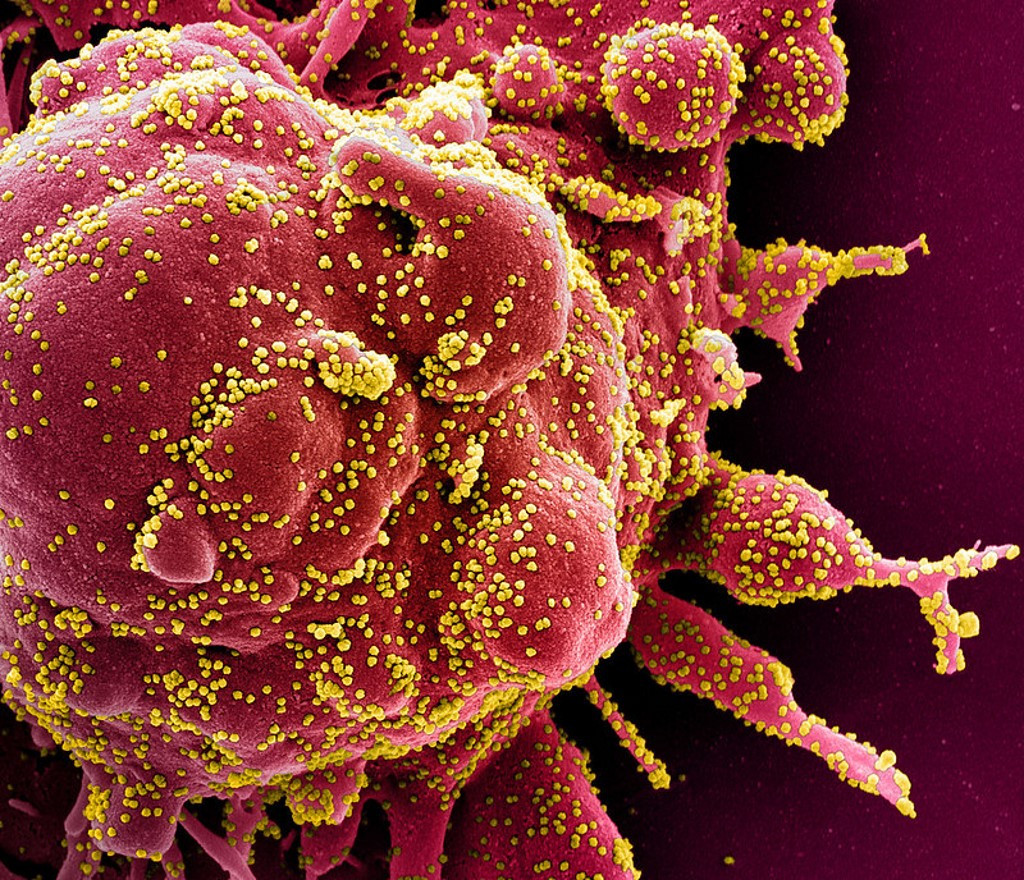Popular Reads
Top Results
Can't find what you're looking for?
View all search resultsPopular Reads
Top Results
Can't find what you're looking for?
View all search resultsDisease puts 1 in 5 globally at severe COVID-19 risk: Study
Change text size
Gift Premium Articles
to Anyone
 This handout image obtained on April 29, 2020 and released by the National Institute of Allergy and Infectious Diseases (NIAID) of the National Institutes of Health (NIH), shows a colorized scanning electron micrograph of an apoptotic cell (red) heavily infected with SARS-COV-2 virus particles (yellow), isolated from a patient sample captured at the NIAID Integrated Research Facility (IRF) in Fort Detrick, Maryland. An estimated 1.7 billion people -- more than 20 percent of the world's population -- risk becoming severely infected with COVID-19 due to underlying health problems such as obesity and heart disease, analysis showed Tuesday. (AFP/Handout / National Institute of Allergy and Infectious Diseases )
This handout image obtained on April 29, 2020 and released by the National Institute of Allergy and Infectious Diseases (NIAID) of the National Institutes of Health (NIH), shows a colorized scanning electron micrograph of an apoptotic cell (red) heavily infected with SARS-COV-2 virus particles (yellow), isolated from a patient sample captured at the NIAID Integrated Research Facility (IRF) in Fort Detrick, Maryland. An estimated 1.7 billion people -- more than 20 percent of the world's population -- risk becoming severely infected with COVID-19 due to underlying health problems such as obesity and heart disease, analysis showed Tuesday. (AFP/Handout / National Institute of Allergy and Infectious Diseases )
A
n estimated 1.7 billion people -- more than 20 percent of the world's population -- risk becoming severely infected with COVID-19 due to underlying health problems such as obesity and heart disease, analysis showed Tuesday.
The novel coronavirus, which has killed more than 420,000 people globally during the first wave of the pandemic, adversely effects patients suffering from co-morbidities.
A team of experts from the London School of Hygiene and Tropical Medicine analyzed global data sets of illnesses including diabetes, lung disease and HIV used these to estimate how many people are at heightened risk of serious COVID-19 infection.
They found that one in five people have at least one underlying health problem putting them in greater danger.
While not all of those would go on to develop severe symptoms if infected, the researchers said around 4 percent of the global population -- around 350 million) would likely get sick enough to require hospital treatment.
"As countries move out of lockdown, governments are looking for ways to protect the most vulnerable from a virus that is still circulating," said Andrew Clark, who contributed to the study.
"This might involve advising people with underlying conditions to adopt social distancing measures appropriate to their level of risk."
Clark said the findings could help governments make decisions on who receives a COVID-19 vaccine first when one becomes available.
Consistent with other studies about COVID risk, the authors found that older people are in greater danger of getting seriously unwell from the virus.
Less than 5 percent of people aged under 20 have an underlying risk factor, compared with two thirds of over 70s.
Countries with younger populations have fewer people with at least one underlying condition, but risks vary globally, according to the analysis.
Small island states such as Fiji and Mauritius have among the highest rates of diabetes -- a known COVID-19 risk factor -- on Earth, for example.
And countries with the highest prevalence of HIV/AIDS, such as eSwatini and Lesotho, also need to be vigilant, said authors of the research published in The Lancet.
In Europe, more than 30 percent of people have one or more health conditions, it showed.
Writing in a linked comment, Nina Schwalbe from Columbia University Mailman School of Public Health, said the study showed "it is time to evolve from a one-size-fits-all approach to one that centers on those most at risk."









